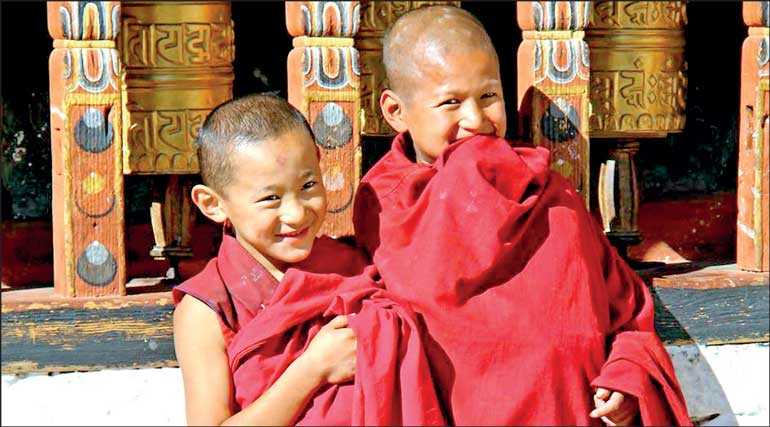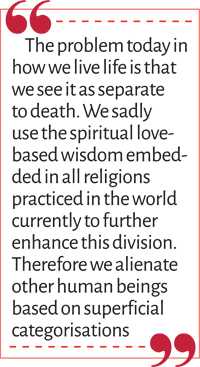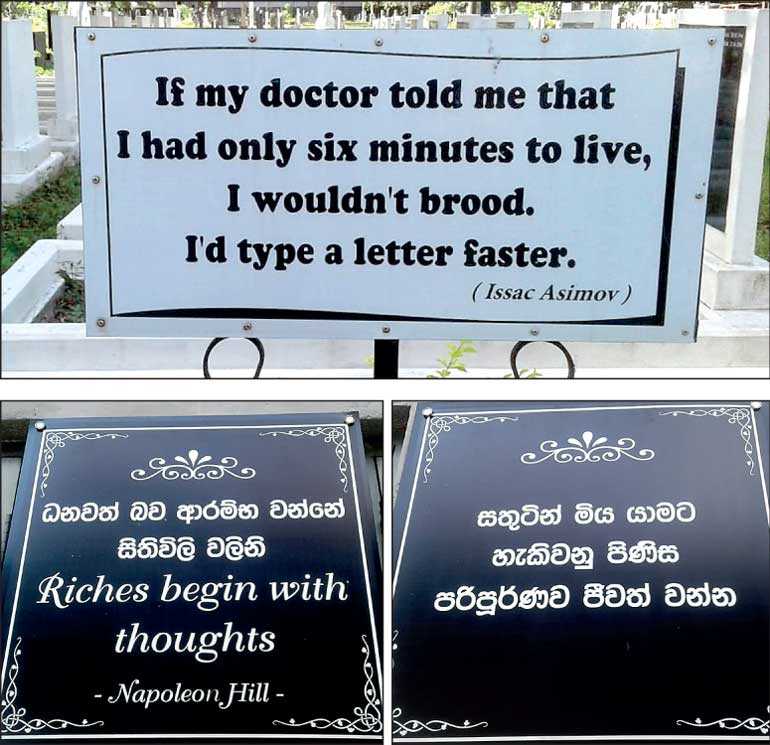Tuesday Feb 17, 2026
Tuesday Feb 17, 2026
Saturday, 10 October 2020 00:10 - - {{hitsCtrl.values.hits}}

In Bhutanese culture/religious training, it is known that every child is taught to think about death five times a day. It is therefore not surprising that this small country is known as the kingdom of happiness, having devised the Gross National Happiness (GNH) category as an alternative indicator for Gross Domestic Product (GDP), to measure progress or development
By Suryamithra Vishwa
Last week in this page we focused on how we should ideally live, with regard to securing the wellbeing of the planet and thereby our own; looking at how we could use some of our traditional/indigenous knowledge practices for a truly genuine sustainability.
This week we look at a connected aspect; at death. To talk about life is not possible unless we talk of death. Death is not a morbid topic as many in this modern world would have us believe. Talking about death is possibly the wisest thing that one could do within one’s life; so that we will learn how to live.
Despite holding the view that attending funerals is more or less for social display purposes, and that the most important thing is to wisely influence the life of people instead of appearing at their funeral ceremony, I somewhat adjusted this perception when I attended the funeral of the brother-in-law of a friend. I now agree with an acquaintance who was critical of my earlier approach to funerals and who maintained that they are places where great solidarity is seen, where one could learn much from and that to attend a funeral is an act of great merit.
This particular death was considered untimely. He was a highly recognised professional in his 50s and went into a coma suddenly while engaging in his official duties. Where worldly ethnic definitions go, he was a Sinhalese and a Buddhist while my friend is a Malay Muslim whose family is a typical example of what it is to be Sri Lankan. The several inter-racial, inter-religious marriages within the family is owing to wise parents who largely believed that children should choose those they value as human beings and for their ethics, rather than let their religious label make the determination.
The wife therefore of the said gentleman was Muslim and their two children, known for highly-acclaimed education prowess, had grown up seamlessly exposed to not only Sinhalese Buddhist tradition and Islam as part of their immediate family exposure but also Christianity as well, as a large segment of the extended family had married into Catholic and Christian families. 
Multi-cultural mix
The funeral parlour was therefore representative of this intermix of Sri Lankan current day multi-culturism. The ceremony in general was conducted in the Buddhist tradition and the body cremated. However some of the Catholic practices such as singing hymns sung usually at funerals were also carried out at appropriate moments.
The Buddhist rituals were attended to by almost all the Islamic immediate family members and three days later for the Buddhist rites as per Buddhist custom that followed in the home of the deceased, the main arrangements for the rituals was done by one of the Malay sister-in-laws of the diseased. She had worked in administration departments of several institutions and handled the preparation for such functions in her official capacity.
The last I heard from this family, the Muslim customs associated with the aftermath of funerals and meant for those in mourning, were being adhered to by the Malay family members who I know are very devout and particular about following their spiritual tradition, for their personal upliftment, while having no qualms about respecting/taking part in non-Islamic rituals with their other non-Muslim family members.
Thus the vast crowd that gathered at the Borella cemetery last week witnessed the Muslim male family members carrying the body to be cremated and all close family members, whatever their religion, taking part in the cremation rituals. Diverse attire denoting different religions/culture were seen; ladies adorned with the Dharma Chakra or crosses around their neck, men who wore traditional culturally defined attire or the now commonly worn everyday Western attire, women who chose to wear scarves or not or dressed in a more austere form of attire such as the full cover. The languages spoken that I heard were Sinhalese, English, Tamil and Ja.
The Sinhalese Buddhist diseased person, highly claimed for his virtuous deeds and helpful nature while alive, had been highly popular with some of the family members in the Muslim side who practiced the more austere form of Islam (such as full cover). One such attired female family member was seen paying her last respects, and I was told by another family member that this gentleman had helped her family members to find jobs at a particular tough time in their life.
The two elderly ladies, the Buddhist mother of the diseased and the similarly saree clad Muslim mother of the wife of the diseased were seen consoling each other. All who had gathered, irrespective of their religious orientation were seen in deep reflection of the words of insight about the temporary nature of life, reminded by the Venerable Buddhist Monk who officiated the Buddhist rites prior to the cremation. His words were centred on the fact that we enter this life without invitation and leave also without invitation.
The rest of my words as written below are inspired by this perennial truth.
Why do we make life such a struggle?
When we know the above fact that life is just a borrowed trip, why do we make it such a struggle and create so many conflicts, divisions and stress for ourselves and others (including the planet, as mentioned in the article last week)? http://www.ft.lk/harmony_page/How-we-have-killed-sustainability-and-how-we-can-revive-it/10523-706933
If there is one thing that life is meant for, it is to teach us how to live. While many of us may not realise this in our teen years or even our twenties, owing to a very materialistic education system and values, some of us may open our eyes to this earlier than later in life. Some of us, maybe many, may never do. We may therefore acquire age without wisdom. Spend time without contemplation. Be busy without meaning. Do things as part of a cog in wheel. And we may live and die, shackled in the unawareness that life is only meant as a path towards love and enlightenment. The path of unconditional love and caring has nothing to do with the kind of material and obsessive disorder made popular all around us and mistaken as ‘love’.
Interestingly recently, a very successful professional who had spent much time overseas and had enjoyed a very flamboyant life was boasting about his female conquests and when I asked him if he had been ‘in love’ his response was ‘what is that?’ I asked him if he has been in love with the sky and earth because love is a phenomena that has no boundaries. Unfortunately today when we say we ‘love’ …say fish… (for example – when someone drools over a tasty fish curry) we mean that we love killing and eating the fish and not love admiring it while it swims in its home!
Love in Metta meditation
However the question ‘What is love?” is a vital one and closely connected with the overall question ‘What is life?” It is known that meditators who do the Metta meditation; on unconditional love have near magical lives; no illness, no enemies and no afflictions of jealousy. The Pali word Metta combines the four qualities of true love; benevolence, friendship, affection, and kindness.
In this method one would love the success of others as much as one would love one’s own success. The concept of birth, life, love and death could hence all be seen as strands of the same element as many sages and religious founders across cultures found in their search for meaning and liberation. Sometimes these strands seem to be separate to each other, but they are one.
Therefore to live a truly rich life; rich in values and value based action, we should train ourselves to think regularly about death. In Bhutanese culture/religious training, it is known that every child grows up taught to think about death five times a day. It is therefore not surprising that this small country is known as the kingdom of happiness, having devised the Gross National Happiness (GNH) category as an alternative indicator for Gross Domestic Product (GDP), to measure progress or development.
Happiness and the concept of love and wisdom, is not just indicative of how we deal with humans, it is connected with how we deal with the entire family of life of our common Mother, the earth. Bhutan’s philosophy and policy of having 60% of its land in forest cover and under protection is an act of love; to humans, trees and animals. This act contributes strongly to keep at bay the rest of the world’s climate change apocalypse.
Joy through Abhidhamma
I will end with an individual example from Sri Lanka of how the contemplation of death can bring absolute joy and lead us towards a meaningful life. A highly qualified colleague in academia is particularly different. She cares little for her paper qualifications. She is reputed for her meticulous work and her consistent exuberant, genuine smile and helpful nature.
Having associated her closely through scholarly work, I know she never ever talks badly about anyone; never entertains gossip and brushes aside any harm anyone may do to her. Her general conversations are about knowledge and anything that can benefit someone. She saves people from gossip attacks and the many manifestations of professional jealously. After some time of closely observing her, I came to know her secret of living a life of joy. She is a serious meditator/student in the Abhidhamma tradition, which defines consciousness in detail through the process of birth and death. She attends Abhidhamma classes almost daily.
The problem today in how we live life is that we see it as separate to death. We sadly use the spiritual love-based wisdom embedded in all religions practiced in the world currently to further enhance this division. Therefore we alienate other human beings based on superficial categorisations; colour, caste, wealth, belief, to name a few.
Yet, one day kings, presidents and beggars… of all cultures/religions/traditions… will occupy the same earth that they trod upon and created stability or mayhem, division or love, war or peace.

(Suryamithra Vishwa is a Sri Lankan who strives to transcend beyond inherited birth identity. A student of meditation, she has a keen interest in comparative spirituality and indigenous knowledge. Her academic training has been in sociology and she is a curriculum writer and visiting lecturer in Mass Communication at a national university in Sri Lanka under her inherited family name. She has for over 20 years worked as a writer for local and international publications and has been associated with the peace building/training sector. Her library of 15,000 books, of which a large number is on global literature, indigenous knowledge, science, comparative religions and secular spirituality has been opened up for the public free of charge. Those interested in borrowing any book could contact 0812494285. She cultivates trees using ancient biodiversity centred methods of cultivation and promotes the concept of ‘Integrated Knowledge’ linking diverse aspects of knowledge to create stimulating thinking and innovative practical initiatives that benefit the individual as well as the country.)